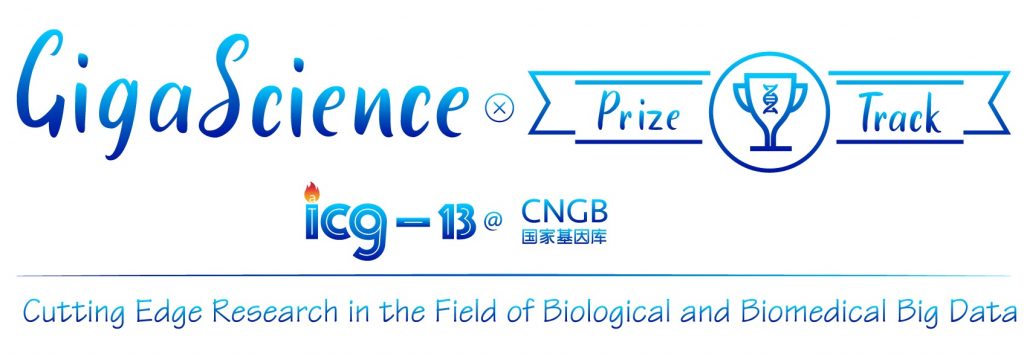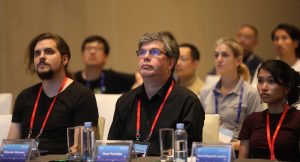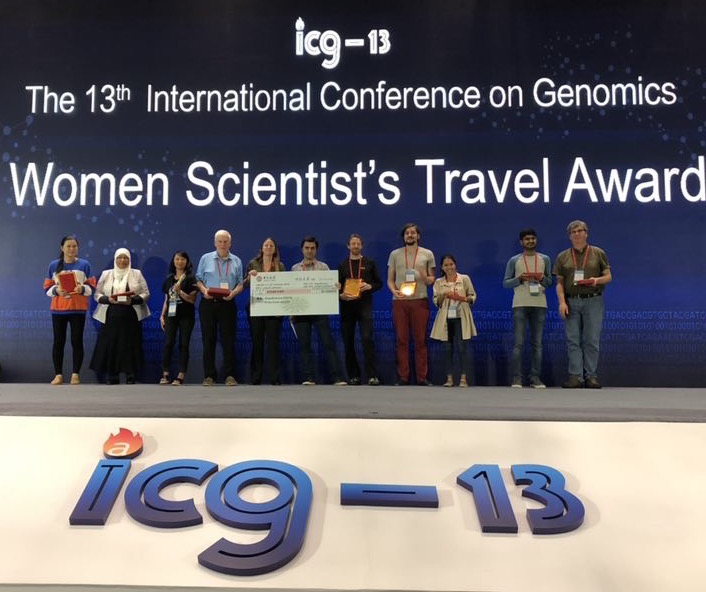And the winner is…volume 2. ICG13 prize winners on GigaTV
 Just out in GigaScience is a new paper presenting Rice Galaxy, an open resource for plant science using the Galaxy workflow management system we are so fond of. The authors from the International Rice Research Institute in the Phillipines are winners of our 2018 ICG13 Prize, and as this is the final paper to be published we can now present a summary of the competition. While we’ve assisted in organising a number of thematic tracks over the 8 years we’ve attended BGI’s annual International Conference on Genomics (ICG) conference, including ICG-8’s open science and ICG-10’s community genomics sessions, since ICG12 we’ve decided to go one step further and organise our own competition and prize track. With the aim to promote submission of new, cutting edge research in to the conference and journal, the quality of entries has been extremely high and we’ve been very happy with the results. Some of our winning papers even getting highlighted in Nature and Newsweek.
Just out in GigaScience is a new paper presenting Rice Galaxy, an open resource for plant science using the Galaxy workflow management system we are so fond of. The authors from the International Rice Research Institute in the Phillipines are winners of our 2018 ICG13 Prize, and as this is the final paper to be published we can now present a summary of the competition. While we’ve assisted in organising a number of thematic tracks over the 8 years we’ve attended BGI’s annual International Conference on Genomics (ICG) conference, including ICG-8’s open science and ICG-10’s community genomics sessions, since ICG12 we’ve decided to go one step further and organise our own competition and prize track. With the aim to promote submission of new, cutting edge research in to the conference and journal, the quality of entries has been extremely high and we’ve been very happy with the results. Some of our winning papers even getting highlighted in Nature and Newsweek.
Everyone’s a winner…and now in Panopto

Three of our fabulous ICG13 prize speakers.
The top six submissions were given the opportunity to present their work in our special session at ICG13, and were given free registration, accommodation and travel to come out to the spectacular China National Genebank building in the Shenzhen countryside. After the success of the first year, in 2018 we had double the number of submissions, and our excellent judging panel (including Huanming Yang, Laurie Goodman, Lachlan Coin, Paul Horton, and 2017’s winner Taras Oleksyk) had a tough job to select and rank the winners. We’ve already announced and profiled some of the winners in GigaBlog, but you can see more on who won the grand prize of $1000 and free article processing charge (the runner up also received a full APC waiver, with the other winners getting 50-75% discounts on top of their travel expenses) below. As with the first edition, all the ICG13 prize talks were filmed and we have them online on our GigaTV youtube channel for your viewing pleasure. For viewers behind the Chinese great firewall we’ve also posted them in our youku channel. OUP have just integrated our journal with the Panopto video platform and e-learning platform, and the IRRI Galaxy paper can is our first example demonstrating its functionality by integrating the slides, video and captions. You can view the Panopto session here and the embedded in the Rice Galaxy example below.
Lisa Johnson (UC Davis) on reprocessing microbial eukaryotic reference transcriptomes.
The first talk was from Lisa Johnson on her work that can aid in revealing new biologically relevant findings and missed genes from previously generated transcriptome assemblies. Teaching old data new tricks, and maximising every last nugget of information from previously funded research. Being based in the lab of our Editorial Board Member Titus Brown, the group are big advocates of Open Science, and our judges appreciated their efforts sharing all the input and output data and pipelines, as well as the important lessons in reproducibility this work (and accompanying commentary) provides. Lisa made a sterling effort overcoming some of the technical problems we were having with the AV equipment, and you can see some winning author profiles in GigaBlog for more insight, and the video, slides and published paper.
Stefan Prost (Senckenberg Museum) on genomes of paradise.
The second talk was from Stefan Prost, presenting new genomic data from five birds-of-paradise reveal genes that are shaped by selection and help explain the origin of their spectacular plumage. Being big fans of bird genomes (see our support of the Avian Phylogenomic and B10K projects) its great to see more avian genomes taking flight. As enigmatic species that capture the imagination, there are “behind the paper” profiles in Nature Ecology & Evolution and GigaBlog, and you can see the slides, video and published paper online.
Anil Thanki (Earlham Institute) on the Aequatus homology browser.
In the first of two talks presenting Galaxy based workflows, Anil Thank then presented the Aequatus Open-Source homology browser. The tool provides an intuitive way to visualise homologous genes among species using the latest web technologies available to represent genomics data. Also part of our Galaxy series, you can read more in a GigaBlog profile, and see the slides, video and published paper online.
Venice Juanillas (IRRI) on Rice Galaxy.
Building on the terabytes of sequencing data first presented in our Rice 3K Data Note in 2014, Venice Juanillas presented the second Galaxy based system in the track. While downloading and using compute the 13TB of raw and 100TB processed data is prohibitively expensive for those working on rice breeding in the regions dependent on the crop, using the Galaxy platform and processing the data down to such a level means it can be cost effectively shared. The democratising potential of this example presented by us at the International Data Week conference in Botswana in November (see in GigaBlog). As the final paper published in the series, its also our first available in Panopto. With the slides and youtube version also available.
Paul Pavlidis (UBC) on GO Track.
The penultimate talk was from Paul Pavlidis presenting GOtrack, which provides access to historical records and trends in the Gene Ontology (GO). Nicely timed for the 20th anniversary of the Gene Ontology Consortium, the data outputs should give biologists a greater understanding of where Gene Ontology Annotations come from and how they change over time, as well as their impact on the major use case for GO/GOA enrichment analysis. For more see the slides, watch the video and read the published research.
Ricardo Wurmus on PiGx pipelines with GNU Gui.
The final ICG13 prize talk was from Ricardo Wurmus on implementing the GNU Guix cross-platform package manager as a solution to reproducibility problems in complex bioinformatics workflows. This resulting set of pipelines is referred to, collectively, with the acronym PiGx (for Pipelines in Genomics). Nicely promoting our interests in reproducibility, the utility of these pipelines are demonstrated for a number of genomics data analysis use cases. You can see more from the slides, video and published paper.
…but there can be only one (again).
Following the ICG13 prize track, at the conference banquet our Editorial Board Member Stephen O’Brien presented trophies to all the winners, but only one could take home the giant cheque, trophy and grand prize of $1000. All of the shortlisted papers were fantastic and worthy winners, but judges selected Lisa Johnson and her metatranscriptomic re-analysis work (pictured with the other ICG13 prize and Women in Science award winners collecting her giant cheque).

You can see our pictures of the conference on our facebook page, and watch the 20 minute talks in your own time, as well as the videos from our ICG10 and ICG12 talks. We are uploading the remaining talks into Panopto, and watch this space for announcementson what will be happening at this years ICG14 conference.